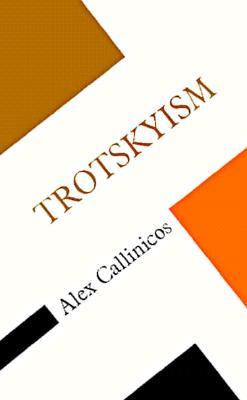Saturday, April 26, 2014
Book Review: Trotskyism by Alex Callinicos
Alex Callinicos' Trotskyism (full text here) is a guide to the political philosophy of Leon Trotsky, as well as the various fragmenting and squabbling factions that claimed his heritage after his death. The book is helpful in drawing out the differences in various tendencies but, as this review indicates, the further the book goes on the less reliable and representative of Trotskyism it becomes (ending with a detailed analysis of Callinicos' favorite sect). Below I will offer a thumbnail sketch of the book's content, with an emphasis on the earlier material.
Callinicos frames Trotskyism as "best understood as the attempt to continue classical Marxism in conditions defined by, on the one hand, the success of the advanced capitalist countries in weathering revolutionary pressures that were at their greatest in the inter-war years, and on the other, the betrayal of the hopes raised by the October Revolution by the rise of Stalinism in the USSR and its extension after 1945 to Eastern Europe and China." (2-3) The Trotskyist tradition can be contrasted with that of Western Marxism in that it does not share the latter's "distance from any form of political practice and... preoccupation with questions of philosophy and aesthetics." (3)
He admits, however, that Trotskyism has often functioned as "a welter of squabbling sects united as much by their complete irrelevance to the realities of political life as by their endless competition for the mantle of orthodoxy inherited from the prophet. ... [T]his image has a large degree of truth. Yet the marginality and fragmentation of the Trotskyist movement do not of themselves constitute grounds for dismissing the ideas which it embodies and has sought, in various ways, to develop." (1-2)
Trotskyism takes much of its theory from the concepts expounded in Trotsky's writings and practice. For instance: combined and uneven development (8), permanent revolution (9) (at the time that he essentially won Lenin over to this position -- also to be contrasted with the Menshevik stagist position -- he joined the Bolsheviks; Trotsky also was won over to Lenin's centralized party idea at roughly the same time) and his opposition to popular fronts (11) (but support of united fronts).
Stalin differed with Trotsky (particularly in the Left Opposition) over socialism in one country (12), the New Economic Policy (13), collectivization and the Five Year Plan (14) -- "Trotsky himself had advocated much lower growth targets than those set in the First Five Year Plan and opposed the coercion of the peasantry into collective farms" (14). After his expulsion from the USSR, Trotsky wavered on whether a revolution would be necessary to overthrow Stalin or whether it could be accomplished by reforms, but he did both term the USSR a degenerated workers' state (15) and maintain that the unaccountable bureaucracy that Stalin headed was not a class in and of itself.
In founding the Fourth International (FI), Trotsky made a series of predictions that would prove to be contradicted. Most importantly, he believed that capitalism was about to collapse ("Mankind's productive forces stagnate") (19) and that therefore "the historical crisis of mankind is reduced to the crisis of the revolutionary leadership." (20) The FI's attitude towards World War II was to support the USSR (24), while predicting that the Stalin regime and Western democracies would be overthrown in the process (26); also, that the democratic powers' victory would be just as frightful as that of the fascist powers. (23)
Another dilemma for Trotskyism was Stalin's post-WWII conquest of "buffer states" (and the Stalin-eque Chinese Communist Party takeover in 1949) -- were those states now socialist states as well, since the state now controlled the means of production, even if they had become that way via "revolutions from above" and not proletarian uprisings? (27) The FI came up with a new category of a deformed workers' state to classify these regimes. (32)
A split in the Fourth International turned around Pablo and Mandel's philosophies. Most notably, some in the FI condemned the "Pabloism" of advocating entrism sui generis, seemingly subordinating Trotskyists to Stalinist parties. The Pabloist International Committee of the Fourth International formed as a result of irreconcilable differences with the FI. (35)
Max Shachtman broke with the FI and formed the Workers' Party in part because of his disagreement with supporting the USSR after the Hitler-Stalin Pact (among other differences). (24) He would go on to form a school of thought that rejected Trotsky's explanation of the USSR's degeneration in favor of a theory of bureaucratic collectivism. Many of its adherents later turned towards the political right. (60)
Another method of rejecting Trotsky's degenerated workers' state analysis of the USSR was viewing the USSR as a form of state capitalism. This theory was upheld both by C.L.R. James and Raya Dunayevskaya of the Johnson-Forest Tendency as well as Tony Cliff. (Chapters 4 and 5)
Subscribe to:
Post Comments (Atom)

No comments:
Post a Comment